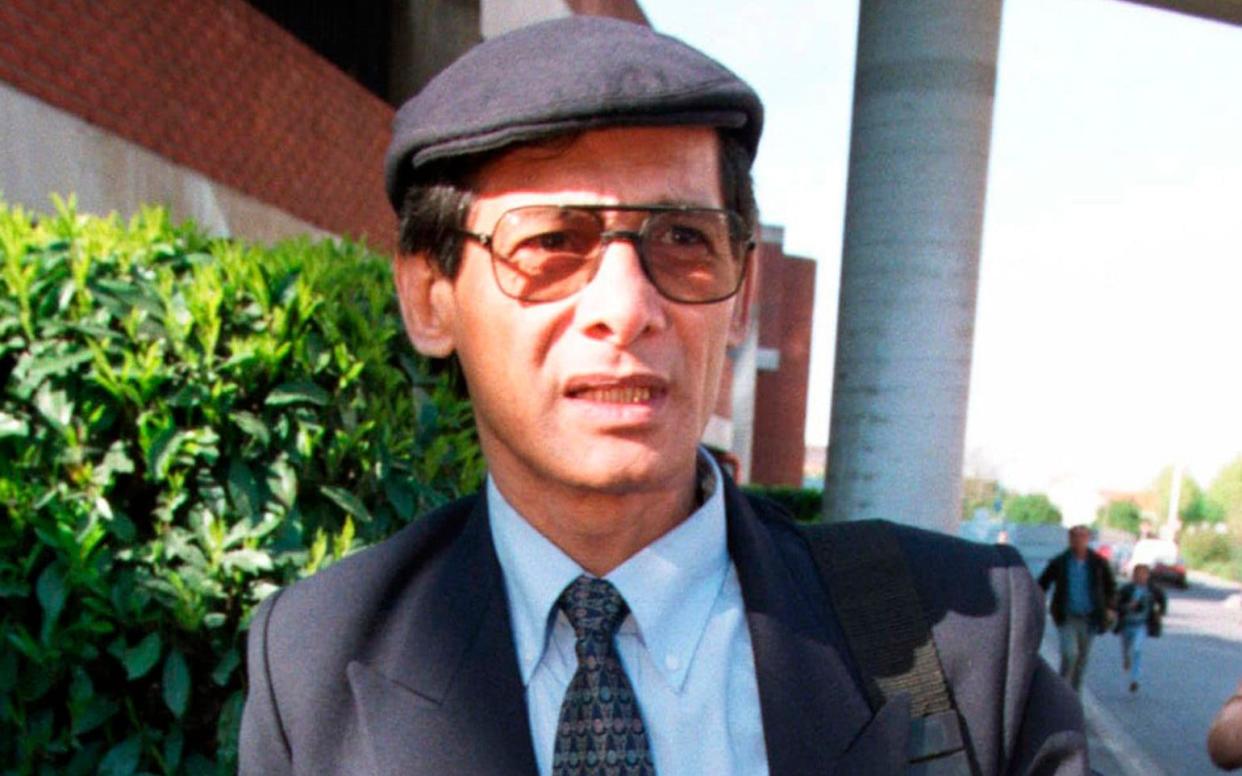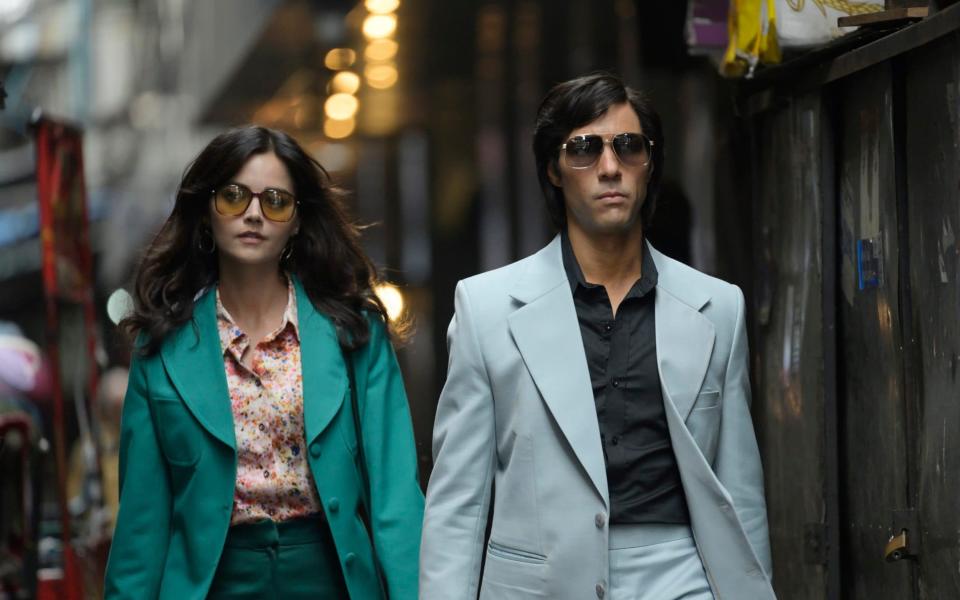My chilling encounter with serial killer Charles Sobhraj

In December 2003, Central Jail in the Nepali capital Kathmandu was everything one might expect from a prison in a developing country. Its high walls, interspersed by watchtowers topped with barbed wire, were patrolled by armed guards. The visitor’s room was a cold, dirty, rectangular cell, divided by a chest-high wall topped with a wire fence. Visitors were forced to sit on low benches. One had to crane one’s neck upwards to see the prisoners on the opposite side of the wire, their hands and feet shackled. When the room was busy, everyone shouted.
Charles Sobhraj didn’t shout. Asia’s famed serial killer, gem stone smuggler and notorious prison escapee, now the subject of a BBC/Netflix mini-series The Serpent, was led into the cell by two guards, shackled like the other inmates. He offered a bright smile and, after brief introductions and my request for an interview, asked me if I was married. I didn’t answer this first question, nor any subsequent ones.
Sobhraj, entirely unruffled, launched into a convoluted monologue, crammed with erudition, describing himself as a victim of dark forces conspiring to take his freedom. As the then 58-year old Frenchman was awaiting trial, he worried about incriminating himself, but I sensed that he was keen to talk. He asked me to return once he had talked to his lawyer.
I had been covering Nepal’s vicious civil war and the plight of Tibetan refugees with Canadian photographer Steve Sandford. One of our assignments had fallen through and we were looking for a last story before flying home. As we returned from the Himalayan foothills to a Kathmandu patrolled by heavily armed troops, veteran Nepali journalist Gunaraj Luitel asked me if I’d like to interview Charles Sobhraj.
A few weeks earlier a local photographer had recognized Asia’s answer to Charles Manson at the Yak & Yeti, a luxury hotel casino. Though Sobhraj hadn’t been in Nepal for decades, he stood accused of having killed two backpackers on Freak Street, a hippie enclave south of the city’s historic Durbar Square, where overland travelers had congregated in the 1970s. The police promptly arrested Sobhraj. Luitel got permission from the home ministry and we presented ourselves at the jail.

I’d first heard of Charles Sobhraj in the early Nineties. Tales of his murders and spectacular prison escapes were traded in the backpacker ghettos of India – stories of a chameleon-like man, born in French-colonial Saigon to an Indian father and a Vietnamese mother, and taken to France as a boy where he’d developed a taste for petty crime. In the late Sixties, Sobhraj returned to Asia and made a living from jewelry theft, the smuggling of luxury cars, drugs and gem stone fraud.
The young, handsome man, worldly and fluent in several languages, developed strategies to insinuate himself with vulnerable travelers whom he poisoned, robbed and sometimes murdered. In all, Sobhraj is said to have killed at least 12 men and women across South and Southeast Asia, not for sex or power, but to finance his rambling lifestyle while eluding police forces in Thailand, Nepal, India and Malaysia.
He surrounded himself with a small band of loyal followers who assisted him to befriend suitably lost travelers and to later dispose of their bodies. Sobhraj probably committed his first murders in Thailand. Local media dubbed him the Bikini Killer as two of his victims were found scantily clad in shallow graves near the beach resort Pattaya. By the time suspicious embassies alerted the Thai police to the Bikini Killer’s identity, he had fled for Nepal. He later re-entered Thailand with his companions and was interrogated by police who released the entire gang, fearful of damaging the country’s tourism industry with lurid tales of murder.
In 1976, Sobhraj and several accomplices posed as Delhi tour guides to a group of French students whom they poisoned. Several of the French youngsters overpowered Sobhraj and called the police. Sobhraj was convicted for an earlier deadly poisoning of French traveler Jean-Luc Solomon and sentenced to serve 12 years in Delhi’s Tihar jail. He bribed prison staff with gem stones, lived a life of relative luxury and bathed in international media attention.
Days before his release, Sobhraj hosted a birthday party in his cell, drugged guards and fellow inmates, and escaped in order to avoid extradition to and possible execution in Thailand. His escape antics garnered him the nickname The Serpent. Sobhraj was rearrested in Goa and slapped with another 10-year sentence. He returned to France in 1997 and embarked on efforts to cash in on his notoriety. Why he went back to Nepal in 2003 is anyone’s guess.

“This is a huge miscarriage of justice,” he told me, “I came to Nepal to make a documentary. The judicial system is archaic and unjust. First the police did not believe who I was. My passport states I am Charles Sobhraj. I don’t think there is anyone else in the world who would use that name voluntarily. That proves I have nothing to hide.”
Sobhraj insisted he would shortly walk free, “The police have no evidence. They can’t prove I have been to Nepal before. I am innocent.”
Minutes later, he contradicted his assertion that he had never been to Nepal, “The French Government informed the authorities in Nepal of my release in India in 1997 and requested to be told about any outstanding charges against me. I never heard anything back.”
His arresting officer, Deputy Superintendent of Police, Ganesh K.C., disagreed, “Charles Sobhraj drugged, killed and partially burned 26-year-old Canadian Laurent Carrière and 29-year-old American Connie Bronzich in 1975.”
Ganesh K.C. recounted a chilling experience as a 10-year old that drove him to become a police officer, “I was playing near Kathmandu airport. The morning fog was dense. It was quiet as a grave. Suddenly I saw the police gathered around a body – the naked, burned corpse of a young white woman. The body was charred, except for the head. That’s how police identified the victim as Connie Bronzich. When I joined the force, I told my wife and children that one day I would arrest Charles Sobhraj.”

On our second encounter, Sobhraj was accompanied by three guards. I was also flanked by a couple of prison staff. I was not allowed to make recordings or take notes. The guards followed every word of our conversation, presumably hoping Sobhraj would incriminate himself. He never admitted to a single murder even as he referred to the two excellent biographies (Richard Neville and Julia Clarke’s thorough The Life and Crimes of Charles Sobhraj and Thomas Thompson’s frightening Serpentine) about him.
Consistently upbeat, he sold me his prison experience as if he were enjoying a rustic holiday. “They hold a hundred people in each barrack here. More than two thousand inmates in all. Prison life in Nepal is as archaic as the court system. Luckily, I have privileges – a room to myself and a TV. Through my lawyer, I check my email every day.”
On the subcontinent, he’d long become a household name and parents would tell their children that Charles Sobhraj would eat them if they were naughty. The man in front of me thrived on his myth, proclaiming innocence and hinting at terror in the same breath. He appeared to juggle several identities at once and clearly enjoyed himself. One could easily imagine Sobhraj as a Vietnamese gem stone dealer, a French academic or an Indian textile merchant – the latter his father’s profession.
His persistently engaging demeanor coupled with the false modesty of a veteran of the Asian highways must have dazzled youngsters on the Seventies hippie trail. But on a cold December day in 2003, two days before Christmas, his ingratiating self-aggrandizement was as disturbing as his outrage. “While I was in the news, the police never came to my hotel, never questioned me. Three days before I was due to leave Nepal, they arrested me while I was having dinner at the casino. I was not even charged then. They have no case, no evidence, nothing.”
Outside the jail, several Sobhraj groupies from the US waited to meet the legend. A young, lanky, bespectacled man from the Midwest suggested, “Wondering why Charles Sobhraj kills, is like asking why the sky is blue.” Clearly in awe of Sobhraj’s past exploits, another young man told me he would love to invite the serial killer for dinner upon his release.
Walking through Kathmandu’s busy streets, it struck me that Sobhraj shared some traits with successful politicians, religious leaders and businessmen – he possessed great communication skills and boundless energy to sell his brand. But murder isn’t a brand and having spent decades in Asian jails is hardly success. Surrounded by thousands of shoppers, acutely aware of being as free as anyone around me to go anywhere I liked, I had a strong sense that Sobhraj belonged where he was.
In August 2004, serial killer Charles Sobhraj was convicted to life in prison for the murder of Bronzich on evidence collected by a Dutch diplomat 30 years earlier. Nepal’s Supreme Court upheld the conviction in 2010. In 2014, Bhaktapur District Court convicted Sobhraj for the murder of Carrière.
Now 76 and in bad health, Sobhraj is likely to live out his infamy in a damp jail cell on the roof of the world. Rumors of a release due to Covid-19 have so far proved false. Perhaps the BBC series will provide a final postscript to a man’s sordid career built on brutally denying young innocents the right to live, merely to pay his bills.

